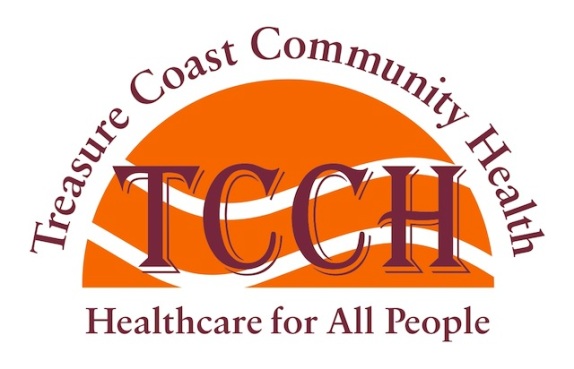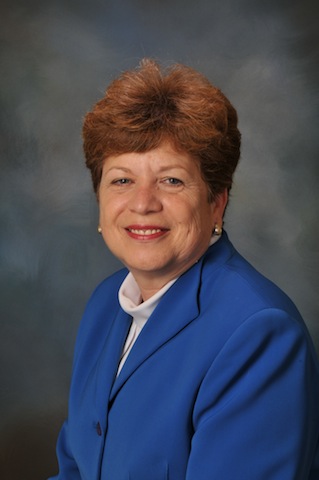A LEADER IN PROVIDING INDIAN RIVER COUNTY (IRC) WITH PRIMARY, PREVENTATIVE NEEDS FROM ITS FOUR MEDICAL FACILITIES, TREASURE COST COMMUNITY HEALTH IS A HAPPY PLACE.
Treasure Coast Community Health (TCCH) currently serves over 16,000 underprivileged people, which is approximately 13% of the Indian River County population.
There are no disputes, no contention or no conflicts surrounding TCCH. “While we do not want to be under the radar, we also do not want to be in the spotlight,” says CEO Vicki Soulé. “We just want to be a happy place treating people respectfully regardless of income. Unfortunately the community does not recognize how comprehensive our services are and how dedicated our staff is to our patients.”
Treasure Coast Community Health CEO Vicki Soulé
TCCH is a Federally Qualified Health Center (FQHC), established 20 years ago in Fellsmere with one doctor and one nurse at Old Fellsmere School. During the past five years TCCH has grown from 42 to 140 employees.
Because TCCH offers primary care and family practice services, its nature is to provide “preventative” services, rather than reacting to emergency situations. “Everyone has a different set of needs and our mission is to help them along the way so in the end they will not require emergency assistance,” says CEO Vicki Soulé.
As an example, she says, “through our preventative mammogram program, where we provide women with continuous screening, for a nominal fee, we have saved the lives of nine women with breast cancer and three women with cervical cancer, who would have otherwise gone unnoticed.”
The concept of a FQHC originated 40 years ago by Senator Ted Kennedy and his brother President John Kennedy and subsequently became a reality in the form of Community Health Centers that emerged from the Lyndon Johnson administration’s War on Poverty in 1965. They were created at the federal level to provide health and social services in poor and underserved communities.
The first community health center in the United States was the Columbia Health Center (CPHC) opened in 1965 as a “pilot” project in Dorchester, Massachusetts serving underprivileged people living in the Columbia Point Public Housing Projects located on an isolated peninsula far away from Boston City Hospital.
Two medical doctors founded CPHC, H. Jack Geiger and Count Gibson. Dr. Geiger had been on the faculty of Harvard University and later at Tufts Medical Center, and Dr. Gibson was also on the faculty of Tufts University.
Subsequently, Drs. Geiger and Gibson established a rural community health center, the Delta Health Center in Mound Bayou, Bolivar County, Mississippi, serving the poverty-stricken counties of Bolivar, Coahoma, Sunflower, and Washington. This center was also set up in conjunction with Tufts University. While the Columbia Point Health Center was set in an urban community, the Delta Health Center represented a rural model.
The federal government’s Office of Economic Opportunity (OEO) funded both Centers.
Since then the Federal Government has set up territories for FQHC’s across the country located in medically underserved areas in order to provide comprehensive primary health care services to everyone with fees adjusted based on one’s ability to pay.
FQHCs receive federal funding through the Health Resources and Services Administration, an agency of the U.S. Department of Health and Human Services. According to Wikipedia, “today, there are more than 1,250 federally supported FQHCs with more than 8,000 service delivery sites” to help service people in need. “Through the years, health centers (FQHCs) have built an impressive track record delivering high quality prevention and primary care to millions of low-income residents in inner cities and isolated rural areas.”
Through its four locations, the Treasure Coast Community Health Center offers a comprehensive array of preventative services, including Family Practice, Primary Care, Women’s Health, and Behavioral Health. Two of the facilities offer dental services, Pediatrics and a pharmacy. TCCH also has labs providing diagnostic tests such as EKG’s.
TCCH is not entirely a free or walk-in clinic. Although it serves all walks of life. It accepts conventional medical insurance, Medicare, Medicaid; or for the uninsured it charges a nominal fee based one’s income, by structuring payment programs, even if it’s five dollars a week. For the indigent or the homeless with no financial resources it provide free medical services. TCCH does not turn anyone away.
In this regard, one of CEO Vicki Soulé’s efforts is to “collaborate with community health care systems to see that those who need care receive it most efficiently and cost effectively, but in a way that restores their health.”


I have 17 years experience in the mental health field in the administrative area. I started from the bottom up (data entry) ending in a Supervisory position. I performed internal Medicaid audits with 100% compliance, supervised a staff of 4 employees and assisted with the Executive Staff developing and problem solving a new computer system.
LikeLike
How can we help you? Where are you located?
LikeLike